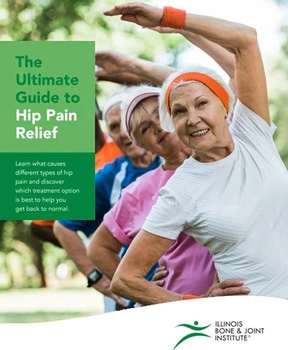Find a Doctor
If this is a medical emergency, dial 911 immediately or visit one of IBJI’s OrthoAccess Immediate Care locations.

While IBJI’s orthopedic surgeons have extensive training in hip care, some conditions may be more appropriate for one type of provider over another.
Our patient support team can help you get scheduled to see the best specialist for your condition or injury.
Talk to an expert at the medical office or clinic where you’d like to be seen.
Conditions, Disorders, and Injuries
The hip care experts at IBJI have an in-depth understanding of the various causes of hip pain. They’ll listen to your concerns, do a thorough exam to diagnose your condition or injury, and create an optimal care plan to help you meet your mobility and pain relief goals.
Causes of Hip Pain
- Carrying Extra Weight
- Hip Arthritis
- Hip Bone Tumors
- Hip Cyst
- Hip Deformity
- Hip Dislocation
- Hip Fracture
- Hip Inflammation
- Hip Injury
- Hip Impingement
- Hip Instability
- Hip Labral Tear
- Hip Laceration
- Bone Tumors
- Broken Hip
- Bruised Hip
- Chronic Hip Pain
- Diabetes-Related Issues
- Dislocated Hip
- Failed Hip Replacement
- Gout
- Infections
- Nerve Conditions
- Snapping Hip Syndrome
- Sprained Hip
- Strained Hip
- Stress Fracture of the Hip
- Tendonitis of the Hip
- Traumatic Injuries
- Trochanteric Bursitis (Hip Bursitis)
- Weak Hips
Hip Treatments
IBJI’s experienced hip care team specializes in today's most advanced surgical and non-surgical treatment options. They will consider your unique needs and lifestyle as they create a customized care plan to relieve your hip pain and help you move better.
Non-Surgical
- Acupuncture
- Heat/Ice
- Imaging (MRIs and CT scans)
- Immediate Care
- Injections
- Massage Therapy
- NSAIDs and Steroids
- Nutrition Counseling
- Occupational Therapy
- Pain Management
- Pilates
- Physical Therapy
- Splints
- Weight Loss Assistance
Surgical
- Hip Arthroscopy
- Hip Deformity Surgery
- Hip Fusion
- Hip Preservation
- Hip Reconstruction
- Hip Replacement: Anterior
- Hip Replacement: Partial
- Hip Replacement: Posterior
- Hip Replacement: Total
- Subchondroplasty
- Surgical Drainage (Debridement)
- Tendon Reconstruction
- Tendon Repair
- Tendon Transfer
Patient Story

“I followed what they said, and at 12 days post-op, I was walking without aid. It was amazing that I could walk without pain.”
Frequently Asked Questions
Does Hip Pain Always Result in Hip Replacement Surgery?
No, hip replacement surgery is not always the recommended treatment for hip pain. Hip care plans are based on a thorough diagnosis of the condition or injury and customized for each individual.
Some hip pain is treated with non-surgical methods like physical therapy, acupuncture, massage, medication, or injections. In other cases, a specialist may recommend minimally-invasive procedures such as hip arthroscopy, hip resurfacing, surgical dislocation, or osteotomy.
A total hip replacement is typically only done if mobility worsens and conservative treatments haven’t helped.
What is Hip Resurfacing?
Hip resurfacing is a conservative artificial joint replacement in which the hip joint is relined instead of being completely replaced. The procedure restores hip functionality by replacing damaged bone and cartilage in the socket while preserving as much natural bone as possible. The femoral head is not removed in hip resurfacing but is instead trimmed and resurfaced with a smooth metal dome.
Hip resurfacing aims to provide greater mobility and improved quality of life, and can be a hip care alternative to traditional hip replacement for some eligible patients.
What is Hip Arthroscopy?
Hip arthroscopy is a minimally-invasive outpatient procedure performed by an experienced hip orthopedic surgeon who inserts a tiny camera into the joint and uses specialized tools to treat cartilage tears, hip impingement, tendon tears, or bursitis.
Because this hip care procedure is minimally invasive, the surgeon can resolve the issue without making a large incision, which means less postoperative pain, faster recovery, and a shorter hospital stay.
Hip arthroscopy is performed to help restore the hip’s function and relieve pain. The surgery typically takes about two hours or less and has a success rate of about 85% to 90%.
What Type of Surgery is Total Hip Replacement?
Total hip replacement surgery is a commonly performed surgical procedure used to treat hip arthritis when movement is restricted and non-surgical treatments haven’t helped to improve mobility or reduce pain.
During this hip care procedure, the damaged hip joint is replaced with implants that recreate the ball and socket of a healthy hip.
The types of arthritis treated by a total hip replacement include arthritis caused by wear and tear (osteoarthritis), inflammatory arthritis (rheumatoid arthritis), and traumatically-induced arthritis.
What is The Difference Between Inpatient and Outpatient Total Hip Replacement Surgery?
With inpatient joint replacement, patients are admitted to the hospital to stay overnight (or longer) as they recover from surgery. This option allows them to be closely monitored by their hip care team.
Outpatient joint replacement—also known as “same-day surgery”—does not require hospitalization. This option allows the patient to receive joint replacement surgery in an ambulatory surgical center and return home in under 24 hours.
The benefits of outpatient total hip replacement surgery are lower out-of-pocket costs and a lower risk of postoperative infection. While it can be a safe and effective treatment option, outpatient joint replacement is not recommended for every patient. Talk to the hip care specialists at IBJI to determine if you are a candidate.
How Long is The Recovery Period After Total Hip Replacement?
Most people will be able to resume light household activities within four to six weeks after total hip replacement surgery.
Return to all normal activities usually occurs after about two to three months, and complete recovery takes about six to twelve months following surgery.
What Activities Can I Participate in After Total Hip Replacement?
Once you heal and recover from total hip replacement surgery, you can enjoy low-impact activities such as walking, hiking, swimming, cycling, and golf.
High-impact activities like basketball, volleyball, and long-distance running are not advised. If you have questions about specific activities, contact your IBJI hip care team.
Related Resources
Check out this collection of videos for more information about some of the most common problems diagnosed and treated by IBJI’s hip care specialists.







